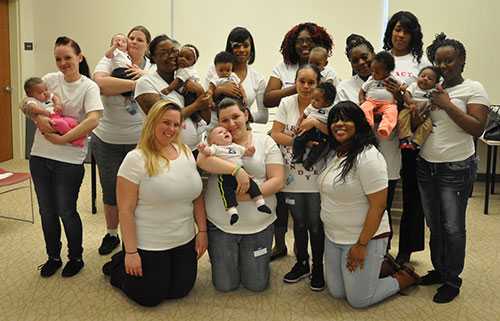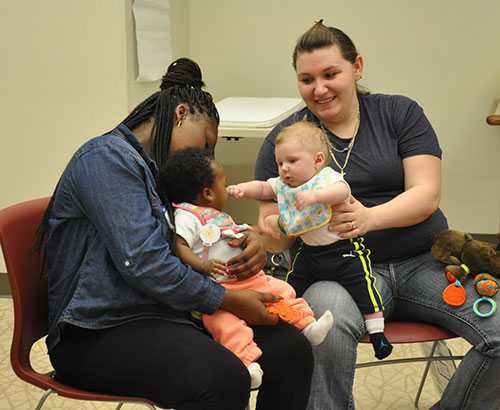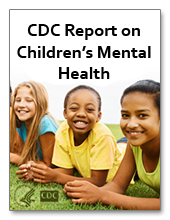Legacy for Children™ Intervention

This page will help you learn about the Legacy for Children™ parenting intervention, including its structure, philosophy, and goals.
What is Legacy for Children™?
The Legacy for Children™ (Legacy) intervention is primarily a group-based intervention approach. Here is how it works: A core part of the Legacy program is regular group meetings of mothers, including mother-only time in group and mother-child time in group. The main purpose of these meetings is to provide mothers with an opportunity to develop and explore parenting goals for their children with other mothers in similar circumstances. The groups are guided by Intervention Specialists who are trained professionals, skilled in leading groups and child development. They assist mothers in identifying and practicing ways to help their children realize individual goals. In addition, Legacy includes one-on-one sessions with mothers that reinforce the program’s activities.
Legacy’s intended ultimate outcome is to have children grow up emotionally healthy and ready to be productive members of society by providing parents with the support they may need to help their children reach that outcome. Legacy’s activities are designed to build on sensitive and responsive parenting, enhance parent-child interactions, and promote a sense of community.
It is important to note that Legacy does not tell mothers how to raise their children. The group sessions encourage exploration, discussion, and trying out a variety of ideas and practices that have led to positive outcomes, allowing mothers to decide what is right for themselves and their children.
Why was Legacy developed?
Experiences and relationships formed in early childhood have major effects on a child’s health and development. Research shows that children living in poverty are at greater risk for poor developmental outcomes, including physical disabilities, impaired cognition, and social-emotional and behavioral problems. These poor outcomes can also have major effects on the mental health and economic well-being of their families and communities. Although young children living in poverty are at high risk for poor developmental outcomes, these children have tremendous potential for growth and achievement.
The Legacy program was based on the belief that parents can have a significant effect on their child’s development, regardless of their circumstances. Even children who face challenges, like family poverty or poor neighborhoods, are more likely to overcome these challenges when their parents are involved and invested in providing a safe, stable, and nurturing base of support. This public health program assists mothers in establishing a new legacy for their children.
What does the intervention look like?
The Legacy program has two tested curriculum versions, one developed by the University of Miami and one developed by the University of California at Los Angeles. They use the same philosophy and goals, but have adapted the program in different ways.
Videos on Legacy
Curricula
Topics: Both curricula cover a wide range of child development knowledge and parenting skills. Topics are repeated as children grow, and they include
- Basic care, health, and safety,
- Language and literacy,
- Social and emotional skills,
- Playing and learning,
- Behavior guidance and limit setting,
- Praise and encouragement, and
- Parent-focused issues, like stress and self-efficacy.
Duration: The two curricula start at different points in the child’s development and have different lengths.
The Miami curriculum starts with parenting groups soon after the children are born, and continues until children are five years old. Parenting groups meet weekly for 1.5 hours, year-round, with a few breaks for holidays.
The Los Angeles curriculum starts with sessions during pregnancy and continues until children are three years old. Parenting groups meet weekly for 2 hours and are conducted in blocks of 10 meetings, each followed by a break of 4 to 6 weeks to allow for home visits.
Sessions: Both curricula include time for mother-only discussion and mother-child interaction.
In the Miami curriculum, each session includes a component focused on building a sense of community, a discussion with activities related to one main topic, and a mother-child time for mothers to try out parenting skills with guidance from the group leaders.
In the Los Angeles curriculum, group meetings alternate between mother-only sessions and mother-child sessions. Mother-only group meetings are followed by special sessions planned by the mothers to build a sense of community.
Special occasions: Both curricula allow for occasional special sessions for celebrations and field trips. These are planned with the mothers during the group sessions. The group sessions are also supplemented by home visits or one-on-one meetings.
Language: The original curricula were developed for mothers who spoke English, either as a first or second language. Translation of the curricula into Spanish is in progress.
Spotlight On: Original Legacy Partners – A Project that Changed Lives
What is the philosophy of Legacy?
Legacy was built on the philosophy that
- Parents can have a positive influence on their child’s development, even when they are facing other big problems in their lives;
- The quality of parent-child relationships is more important than any one parenting practice;
- There is no one “right” way to parent;
- Successful parenting involves thoughtful decisions and a sense of responsibility for the child; and
- Parents can best develop and sustain a commitment to responsibility when they belong to a community of parents who share that sense of parental responsibility.
The program is based on assumptions in four key areas of parenting: parent self-efficacy, the parent–child relationship, parent responsibility, and a sense of community. Click on the following parenting areas to learn more.
Parent Self-efficacy
- Parent self-efficacy means parents believe that they can parent their child well.
- Parent self-efficacy is based on the parent’s beliefs, rather than actual performance or behavior.
- There are many ways to be a “good” parent. Critical aspects of positive parenting include commitment to the parenting role and the belief that parents can influence their children’s development.
- It can be difficult for parents to change how they think about parenting and to change their behavior. Successful experiences with children can help build parental self-efficacy.
The Parent–Child Relationship
- The quality of the parent–child relationship is more important than any single parenting practice or skill.
- Changes take place more easily when the learning environment is safe, emotionally supportive, and builds on current strengths and abilities. This is also true for supporting child development within parent–child interactions and for supporting parents in gaining new parenting skills.
- There are multiple pathways to positive parent–child relationships, and there is no one “right” way to parent.
- Research has identified some common parent behaviors that seem to be linked with positive parent–child relationships, such as the use of appropriate praise and eye contact.
- The same learning principles apply in relationships between children and parents, parents and intervention specialists, and intervention specialists and their program supervisors.
- Children benefit most when the good intentions of parents are expressed as positive parenting behavior.
Parent Responsibility
- Parents’ commitment and sense of responsibility for making planned and thoughtful choices to improve their children’s welfare is a critical factor in positive parenting.
- Parents can have positive influences on their children independent from their personal circumstances and the external stressors in their lives.
- Optimism and personal responsibility can be increased by changing the way parents view events in their lives.
Sense of Community
- Parents gain support from feeling connected to other parents.
- Parents can best develop and keep a healthy commitment to their children’s development when they belong to a community of parents who share a sense of parental responsibility.
What are the goals of Legacy?

The goals of the Legacy program are based on the Legacy parenting philosophy and built into the Legacy curricula. The primary emphasis of the Legacy program is on the relationship between the mother and child. A safe, consistent, and responsive mother-child relationship provides the foundation for learning in early childhood by setting the stage for the child to explore and learn. In this way, the child gains a sense of motivation and a feeling of accomplishment that might not develop in a less supportive atmosphere. The secondary, but still important, emphasis of Legacy is on the mother’s relationship with her community. Legacy mothers gain a feeling of know-how and security when they have the sense of being part of a supportive community. This feeling of competence translates into an even greater investment in parenting, increasing each mother’s ability to be emotionally available and responsive to her child.
The Legacy program is geared towards supporting mothers in making thoughtful choices for their children. The five overall goals of the program are as follows:
- Promote the mother’s responsibility for, investment in, and devotion of time and energy to her child.
- Promote responsive, sensitive mother-child relationships.
- Support mothers as guides in their children’s behaviors and emotions.
- Promote each mother’s ability to influence her child’s verbal and brain development.
- Promote each mother’s sense of community.
- Page last reviewed: July 6, 2017
- Page last updated: July 6, 2017
- Content source:
- Division of Human Development and Disabilities, National Center on Birth Defects and Developmental Disabilities, Centers for Disease Control and Prevention



 ShareCompartir
ShareCompartir

